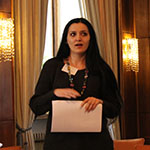Euroacademia Conferences
 Europe Inside-Out: Europe and Europeanness Exposed to Plural Observers (9th Edition) April 24 - 25, 2020
Europe Inside-Out: Europe and Europeanness Exposed to Plural Observers (9th Edition) April 24 - 25, 2020 Identities and Identifications: Politicized Uses of Collective Identities (9th Edition) June 12 - 13, 2020
Identities and Identifications: Politicized Uses of Collective Identities (9th Edition) June 12 - 13, 2020 8th Forum of Critical Studies: Asking Big Questions Again January 24 - 25, 2020
8th Forum of Critical Studies: Asking Big Questions Again January 24 - 25, 2020 Re-Inventing Eastern Europe (7th Edition) December 13 - 14, 2019
Re-Inventing Eastern Europe (7th Edition) December 13 - 14, 2019 The European Union and the Politicization of Europe (8th Edition) October 25 - 26, 2019
The European Union and the Politicization of Europe (8th Edition) October 25 - 26, 2019 Identities and Identifications: Politicized Uses of Collective Identities (8th Edition) June 28 - 29, 2019
Identities and Identifications: Politicized Uses of Collective Identities (8th Edition) June 28 - 29, 2019 The European Union and the Politicization of Europe (7th Edition) January 25 - 26, 2019
The European Union and the Politicization of Europe (7th Edition) January 25 - 26, 2019 7th Forum of Critical Studies: Asking Big Questions Again November 23 - 24, 2018
7th Forum of Critical Studies: Asking Big Questions Again November 23 - 24, 2018 Europe Inside-Out: Europe and Europeanness Exposed to Plural Observers (8th Edition) September 28 - 30, 2018
Europe Inside-Out: Europe and Europeanness Exposed to Plural Observers (8th Edition) September 28 - 30, 2018 Identities and Identifications: Politicized Uses of Collective Identities (7th Edition) June 14 - 15, 2018
Identities and Identifications: Politicized Uses of Collective Identities (7th Edition) June 14 - 15, 2018
Religion and the Education System in Croatia: A Multiple Modernities View
-
-

-
Presentation speakers
- Martina Topić, Faculty of Political Science, Sociology Unit, University of Zagreb, Croatia
- Download presentation
Abstract:
Education often serves as a battlefield for enforcing of the state oriented agenda. Because of that all countries in Europe are, in this way or another, trying to improve its education systems that should serve as a platform for creating European citizens dedicated to goals of the European project. Modernization of education systems throughout Europe is therefore set to enforcement of the civic values while the religious and its role in the education system remains contested issue. This is the case for Croatia, a country scheduled to join the EU in 2013. Official curriculums are prescribing European oriented education that will create European citizenship. But, on the other hand, a whole set of other laws and regulations, such as for example Teaching plans, are enforcing more nationally oriented agenda. Additionally, religious catechism is introduced in schools and Catholic priests sit in committees for approving the history textbooks with which they are enforcing their religious views and religion therefore has a significant position in the education Croatian pupils receive. This education is sometimes one-sided and too nationally oriented while the goal to create European citizenship clearly fails. Finally, the civil society opposes to these practices and envisages society freed from religion, at least to the extent one would be truly free to choose the level religion will be present in his/hers life. The issue this paper is addressing is therefore the notion of secular modernity in Croatia. Modernity is here analyzed through concepts of rationalization, power of humans to independently resolve their problems and secularization of the society. The questions this paper is analyzing are: what is the politics of Croatian authorities in the education system, what reception this politics receive in the society and what are the implications for the future and the common European project. The general attempt is to see how the concept of modernity is understood by the state actors (through the educational legislative) and how this concept is understood by the civil society actors (through their views) and finally, how these apparently opposed views fit into existing theories on religion such as secularization theory and a multiple modernities theory.
-
Related Presentations

East - West Reflections On the Shared Values
- Liliya Sazonova

West versus East – A Question of Trust
- George Yuryev and Ekaterina Bagreeva
















